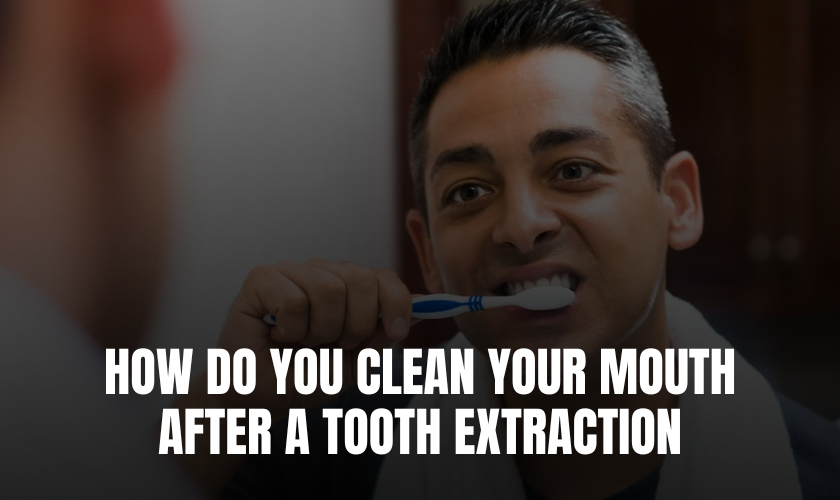
How Do You Clean Your Mouth After A Tooth Extraction
A tooth extraction, while a routine procedure, can be a bit daunting. But fear not! With proper aftercare, you can ensure a smooth and comfortable healing process. This guide will equip you with the knowledge to effectively clean your mouth and promote healing following your extraction.
The Importance of Aftercare
Following a tooth extraction, a blood clot forms in the empty socket, kickstarting the healing process. This clot is delicate and needs to be protected. Improper cleaning methods can dislodge the clot, leading to a painful condition called dry socket. Dry socket delays healing and can cause significant discomfort.
By maintaining good oral hygiene after your extraction, you’ll:
- Minimize the risk of infection by removing food particles and bacteria that can accumulate in the extraction site.
- Promote healing by ensuring a clean environment for the blood clot and underlying tissue.
- Reduce discomfort by preventing irritation and inflammation.
Brushing and Flossing
While you might be tempted to shy away from brushing altogether, gentle cleaning is crucial for optimal healing. Here’s what to keep in mind:
Brushing:
For the first 24 hours after your extraction, avoid brushing directly around the extraction site. However, continue to brush your other teeth gently using a soft-bristled toothbrush. This helps maintain overall oral hygiene and prevents the spread of bacteria. After 24 hours, you can cautiously brush the extraction site with a soft brush but avoid vigorous scrubbing.
Flossing:
Flossing is generally safe after 24 hours, but be very gentle, especially near the extraction site. You can use a water flosser on a low setting for a more comfortable clean.
- Remember: When in doubt, consult your dentist for specific instructions on brushing and flossing after your extraction.
The Power of Saltwater Rinses
Saltwater rinses are a gentle and effective way to cleanse your mouth and promote healing after tooth extraction. How to make and use them is as follows:
- Mix: Dissolve ½ teaspoon of table salt in a cup of warm water. Make sure the water is warm, not hot.
- Swirl: Gently swish the solution around your mouth for 30 seconds, taking care not to swish forcefully. Avoid spitting forcefully as well.
- Repeat: Rinse with the saltwater solution twice a day, especially after meals and before bed.
Saltwater rinses help to:
- Reduce inflammation
- Dislodge food particles
- Promote healing
Note: If you have high blood pressure, consult your dentist before using saltwater rinses. They might recommend an alternative cleaning method.
Additional Tips for a Smooth Recovery
Here are some additional practices that can contribute to a comfortable and successful healing journey:
- Diet: For the first few days following your extraction, follow a gentle diet. This minimizes pressure on the extraction site and makes chewing easier. Opt for foods like yogurt, mashed potatoes, applesauce, and soups. Gradually reintroduce harder foods as your mouth heals.
- Pain Management: Your dentist will prescribe medication to manage any pain or discomfort you might experience. As your dentist has instructed, take the medication.
- Rest: Adequate rest allows your body to focus on healing. After your extraction, refrain from vigorous activities for at least 24 hours.
- Smoking and Alcohol: Avoid smoking and alcohol consumption for at least 72 hours after your extraction. Smoking can hinder healing and increase the risk of infection. Alcohol can exacerbate bleeding and irritate the extraction site.
Signs to Watch Out For
While some discomfort is expected after a tooth extraction, be aware of these signs that might indicate a complication:
- Severe and persistent pain that doesn’t improve with medication
- Excessive bleeding that doesn’t subside within a few hours
- Fever
- Swelling that persists for several days or gets worse
- Pus draining from the extraction site
- White, foul-smelling discharge from the extraction site
- tingling or numbness in the tongue and lips
If you experience any of these signs, contact your dentist immediately. Prompt action can avert issues and facilitate quicker recovery.
When to See a McKinney Dentist
If you’re experiencing a toothache or require a teeth extraction, schedule an appointment with a trusted dentist in McKinney. They will assess your situation, recommend the best course of treatment, and guide you through the extraction process and aftercare steps.
Following a tooth extraction, proper oral hygiene is essential for a smooth and comfortable recovery. By following the aftercare tips outlined above, you can promote healing, minimize discomfort, and avoid complications. Remember, if you have any concerns or experience any unusual symptoms, don’t hesitate to contact your dentist. They are there to guide you through the healing process and ensure a successful outcome.
For residents of McKinney seeking a trusted and experienced dentist for tooth extraction or other dental needs, consider scheduling an appointment with a reputable McKinney dentist. They can provide personalized care and ensure a positive dental experience.
Ans: In most cases, it’s best to avoid commercial mouthwashes containing alcohol during the first few days after your extraction. Alcohol can irritate the extraction site and hinder healing. However, your dentist might prescribe a specific mouthwash for you to use.
Ans: Bad breath is a common occurrence after a tooth extraction due to the limited cleaning you can do around the site. Saltwater rinses can help combat bad breath. Additionally, maintaining good oral hygiene by brushing your remaining teeth and tongue gently can minimize the issue.
Ans: Strenuous activity should be avoided for at least 24 hours after your extraction. However, gentle activities like walking are generally safe. Consult your dentist for specific guidance on when to resume your normal activities.
